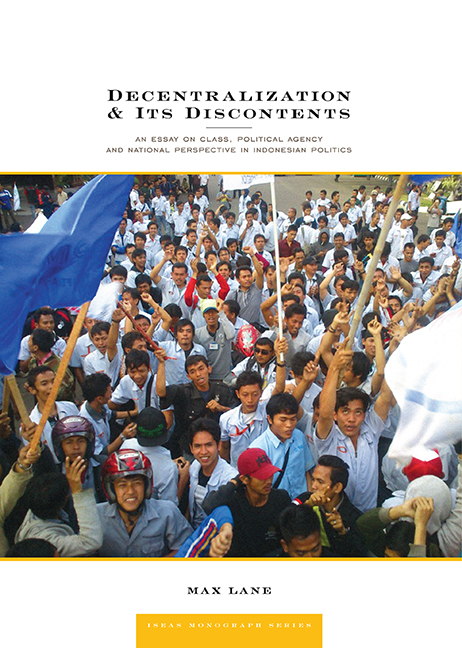 Decentralization and Its Discontents
Decentralization and Its Discontents Book contents
- Frontmatter
- Contents
- Editorial Note
- Preface
- About the Author
- Introduction
- I The Enigmatic Emergence of Decentralization
- II The Political Economy of Desentralisasi
- III Decentralization: Its Discontents
- IV National Agency in a “Co-ordinative State”: The Future of Decentralization
- Conclusion
- Endnotes
- References
- Frontmatter
- Contents
- Editorial Note
- Preface
- About the Author
- Introduction
- I The Enigmatic Emergence of Decentralization
- II The Political Economy of Desentralisasi
- III Decentralization: Its Discontents
- IV National Agency in a “Co-ordinative State”: The Future of Decentralization
- Conclusion
- Endnotes
- References
Summary
The post-Suharto political economy, i.e., post-cronyism, has facilitated a decentralization (introduced during a period of technocratic interregnum under President Habibie and supported by international donor forces) that is set in an anational, political framework. This reflects the absence of any strong national, class-based, political agency that can assert its agenda nationally — whatever that might be. A weakened layer of ex-crony conglomerate capital, no longer protected by the military-backed centralistic Suharto regime, lost its ability to assert a clear national agenda over the plethora of small and medium capitalists operating at a local level, who themselves do not operate on a national scale or have a clear national development perspective. This has accentuated the dysfunctional aspects of decentralization, both in terms of capture of local government and corruption as well as inability to deal with the unevenness/heterogeneity/factor immobility of the archipelago. This weakness also makes it easier for international capital to assert its interests in the formulation of national economic policy. The inadequacy — or in some cases, the complete inability to formulate solutions or identify potential “solutional” trends in the available literature — reflects the absence of a focus on the question of social class and political agency. I hope this essay shows that an analysis which searches for trends that relate to such an agency will yield more explanatory and interesting results and point to the kind of further research agenda that may be useful.
- Type
- Chapter
- Information
- Decentralization and Its DiscontentsAn Essay on Class, Political Agency and National Perspective in Indonesian Politics, pp. 103 - 104Publisher: ISEAS–Yusof Ishak InstitutePrint publication year: 2014
